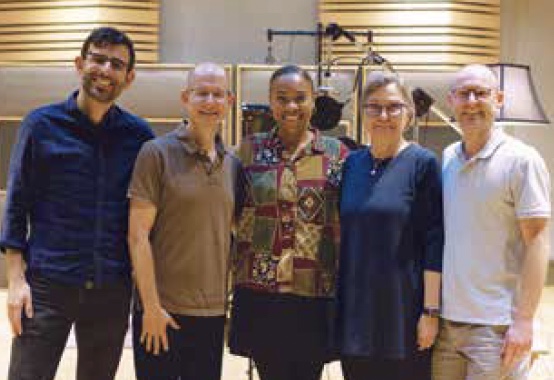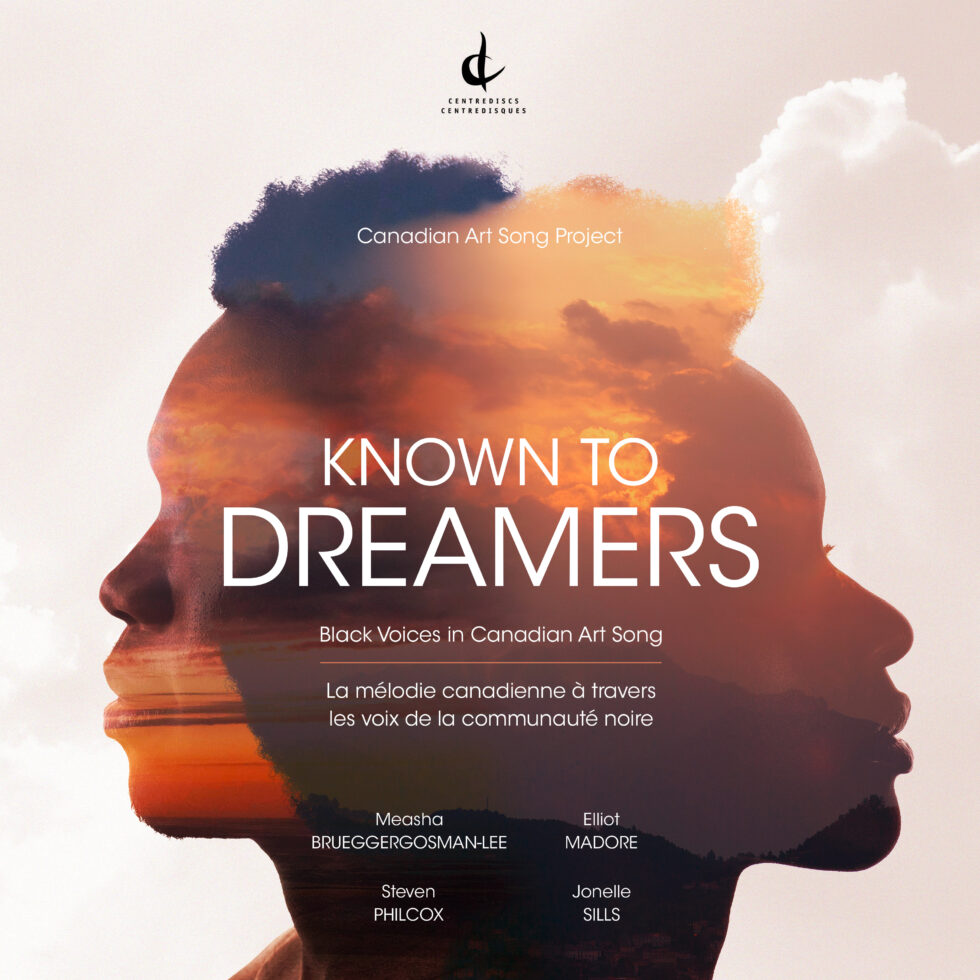SUBSCRIBE TO DIGITAL AND/OR PRINT MAGAZINE
*this text originally appeared in our
2023 winter print issue
Known to Dreamers: Black Voices in Canadian Art Song
Measha Brueggergosman-Lee; Elliot Madore; Jonelle Sills; Steven Philcox
CENTREDISCS — CMCCD 34224 release date: March 1, 2024
Canadian Art Song Project features the contributions of Black Canadian
composers and poets
By Catherine Kustanczy
February 2024 is set to be an exciting month for music and history education in Canada. Known to Dreamers: Black Voices in Canadian Art Song (Centrediscs), initiated and recorded by the Canadian Art Song Project (CASP), features the contributions of Black Canadian composers and poets writing for a medium often taken for granted amidst the larger spectacle of grand opera. The project offers a rich array of sounds, performances, reflections, and direct experiences, elements which CASP Co-Artistic Director and Managing Director Lawrence Wiliford says highlight art song’s power for “storytelling and connection.”
Included on the album is the famous song cycle The Confession Stone by Robert Fleming, with text by African-American writer Owen Dodson.
Exploring the life of Jesus Christ through inner dialogue, the cycle was written for and premiered by contralto Maureen Forrester in 1966 in Montreal, and has since been performed and recorded by an array of opera luminaries including Jessye Norman, Judith Forst, and Wallis Giunta. Also featured on Known To Dreamers are two works by Caribbean-Canadian, Manitoba-based composer-conductor Larry Strachan, “Moths” by James Rolfe, with text by writer André Alexis (whence the album title originates); and The Colour of Joy by composer- pianist-educator Maria Thompson Corley. “It’s a very vulnerable platform,” says Wiliford of art song, “there’s a vulnerability to doing storytelling in song.” The soloists on the album—soprano Measha Brueggergosman-Lee, baritone Elliot Madore, soprano Jonelle Sills—were all keen to engage with this vulnerability, and to recalibrate for a much more intimate if no less powerful form of sung vocal expression, one specific to the idiom of art song itself.
Formed in 2011 by tenor Lawrence Wiliford and pianist Steven Philcox, CASP has a mandate to promote existing Canadian art song repertoire while developing new works. The organization has 18 commissions and seven recordings to their credit; they have worked with a range of Canadian talents including Brian Current, Marjan Mozetich, and Ana Sokolović. Nominated for a 2020 Juno Award for Classical Album of the Year: Vocal Solo Recording, for Healey Willan: Summer Night and other songs for voice and piano (released in 2019), CASP’s recognition of the work of the Anglo-Canadian composer/ organist reflects a wider ethos that integrates education, cultivation, and inspiration. Known To Dreamers expands that ethos while simultaneously highlighting its core mission. “We’re commissioning, researching, editing, and co-presenting concerts,” says Wiliford. “We’re filling gaps nobody else is.”
The extent of that gap-filling was re-appraised following the murder of George Floyd in 2020. “Everybody began asking what it meant for Canada,” remembers Wiliford. “Steven and I sat down and thought about what our role could be in elevating marginalized voices like the African diaspora and Black Canadian voices, in song.” Wiliford set about trying to find Black composers and/or Canadian composers of Black descent, including those holding dual citizenship between Canada and the United States. One of the organizations he contacted was the African-American Art Song Alliance. Founded in 1997, the organization is dedicated to promotion and cultivation of African-American composers, performers, and scholars. As its website states, “this repertoire must be performed, repeatedly, by many performers if it is to make its way into the mainstream of literature.” Composer/ writer/educator Maria Thompson Corley, whose song cycle The Colour of Joy is the sole work on Known To Dreamers, with all-Black creative participants, consists of three songs, with respective texts by Corley, playwright Kanika Ambrose, and director/writer Christene Browne. “For me the music is determined by the text,” says Corley. “Music conveys a psychology of the text; the language of any text has a certain rhythm, and melody has to grow out of the words.”

Above L-R: Pouya Hamidi (Recording Engineer), Steven Philcox (Co-Artistic Director of CASP and pianist), Jonelle Sills, Denise Ball(Co-Producer), and Lawrence Wiliford (Co-Artistic Director of CASP and Co-Producer)
Born in Jamaica and raised in Alberta, Corley has lived in the United States for over three decades. Her work has been commissioned and/ or recorded by a number of institutions (including the Tallahassee Boys Choir and MUSE Cincinnati Women’s Choir) and soloists (soprano Louise Toppin; countertenor Darryl Taylor; soprano-historian Randye Jones). She has also worked extensively as a collaborative and solo pianist, published poetry, short stories and novels, and performed with a range of organizations and soloists including soprano Priscilla Baskerville and baritone Randall Scarlata. On Known To Dreamers Corley aimed to highlight her Black Canadian background. “I wanted to include some flavour of West Indies music – some of those rhythms from my youth,” she explains, “and I wanted it to be something that references my experience, so it was important to have some aspect of Western Canada. The area where I grew up is not far from Amber Valley, a place where people came from the United States to escape enslavement and brave the cold as best they could. I’m grateful one of the poems in the cycle reflects my experience in Alberta.”’
The work holds a special place for its creator. “This is definitely the only cycle I’ve written so far that is specifically about being a Canadian,” says Corley. “I have dual citizenship, but my formative years were in Canada and I’ll never really be an American in some ways. I left when I was 20, but I was formed in Canada and all that means—which is some things hard to put your finger on—but that makes The Colour Of Joy one of the most special things I’ve ever written.”
The title of the work has an especially thoughtful subtext, one that could be applied to the wider project. “In certain communities, and the Black community is one of them, there has been a much-needed examination of a lot of the stuff we’ve had to go through and others have had to go through – or, rather, not had to go through but people chose to put us through for no good reason other than their own power,” she explains, “and it’s important to know about that stuff, but something gets lost, and it’s the idea that we’re not spending all the time suffering victimhood. The two things can co-exist: there are things you should understand about the situation, and things you should not turn a blind eye to; on the other hand, people living dayto- day have to realize you can’t live your whole life with this horrible stuff because you may well die from the stress. There are all these opportunities to be joyful, and you are denying yourself so much if you don’t take those opportunities. We are more than our trauma.”
For her song cycle in particular, Corley admits “there is reference to racism and reference to the idea of struggle, but in the end we persevere; we are still here. We will dance and have time with our families and we will laugh; we will keep going, and we will have joy.”
Corley will be appearing in a live solo performance at Toronto’s Meridian Hall in mid- February with a programme of works featuring Black and European composers, and the premiere performance of The Colour of Joy happening at the end of the month. The concert, being held at the Richard Bradshaw Amphitheatre at Toronto’s Four Seasons Centre, will celebrate the release of Known To Dreamers and feature the live premiere of The Colour of Joy, as well as rarely heard songs by composer-pianist R. Nathaniel Dett—another artist whose works CASP hopes to explore and record in future. “Our organization is now at a point of thinking on a much more broad scale,” says Wiliford. “What is our role as an arts organization? Who is our audience? We might have other projects that focus on Persian composers, or French- Haitian composers—classical vocal storytelling is part of an expression of culture and history, and that’s important to keep exploring.”







